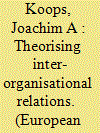| Srl | Item |
| 1 |
ID:
163228


|
|
|
|
|
| Summary/Abstract |
Oil has seriously impacted the institutional development of the state in the Arabian Peninsula. More specifically, the sudden and unprecedented acquisition of massive oil revenues resulted in the freezing of the state’s formal and informal institutions, at the point at which petrodollars were injected into the state’s coffers. From then on, state leaders were able to deploy the state’s wealth to dictate the pace and direction of institutional change. Over time, any institutional change has been directed towards enhancing regime security, and the pace of change has been calculated and deliberately slow. Any political opening has been dictated by the logic of state power maximization (in relation to society). At the same time, partly to ensure its popular legitimacy and partly through the vision of its leaders, the state has deployed its massive wealth both to foster rapid economic and infrastructural development, and to enhance the living standards of its citizens. In other words, whereas oil may have stunted institutional development –– i.e., an institution’s curse –– it has been an economic blessing.
|
|
|
|
|
|
|
|
|
|
|
|
|
|
|
|
| 2 |
ID:
154462


|
|
|
|
|
| Summary/Abstract |
This article explores the historical evolution of research on the “European Union (EU)–North Atlantic Treaty Organisation (NATO) relationship” since the 1950s and examines the numerous ways in which it has served as an important case study for applying and developing theory-guided and conceptual research on inter-organisational relations (IOR) in International Relations. After a dearth of policy-oriented research during the 1990s and early 2000s, a wide range of scholars have contributed to a “conceptual turn” in the study of EU–NATO during the last decade. This development, as this article will argue, not only signifies a stronger interest by scholars to understand the complex relationship between both organisations with the help of more theory-driven research, but also highlights that the EU–NATO relationship has become a “catalytic case study” in terms of inspiring conceptual experimentation and advancing efforts to theorise IOR more generally. The article provides for the first time a systematic stock-taking and analysis of the richness of concepts and theoretical debates related to EU–NATO relations research and offers scholars wider insights into the most promising approaches and analytical tools for understanding and theorising EU–NATO relations.
|
|
|
|
|
|
|
|
|
|
|
|
|
|
|
|